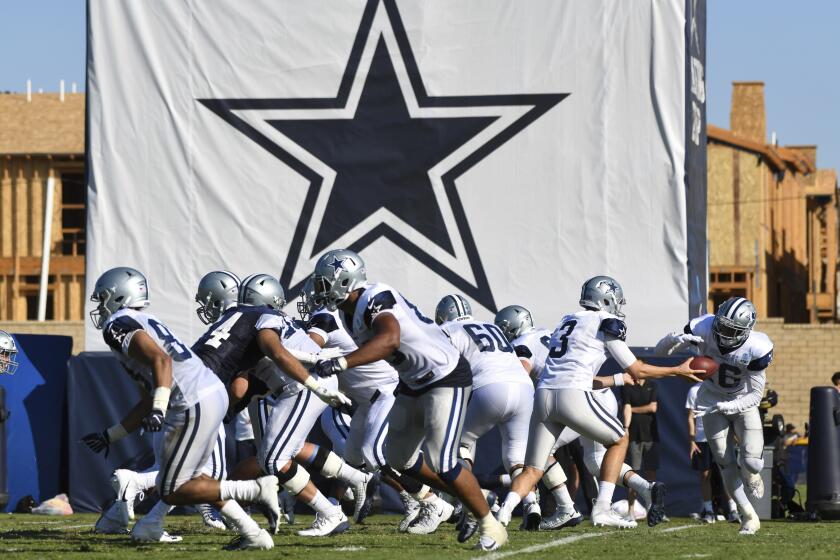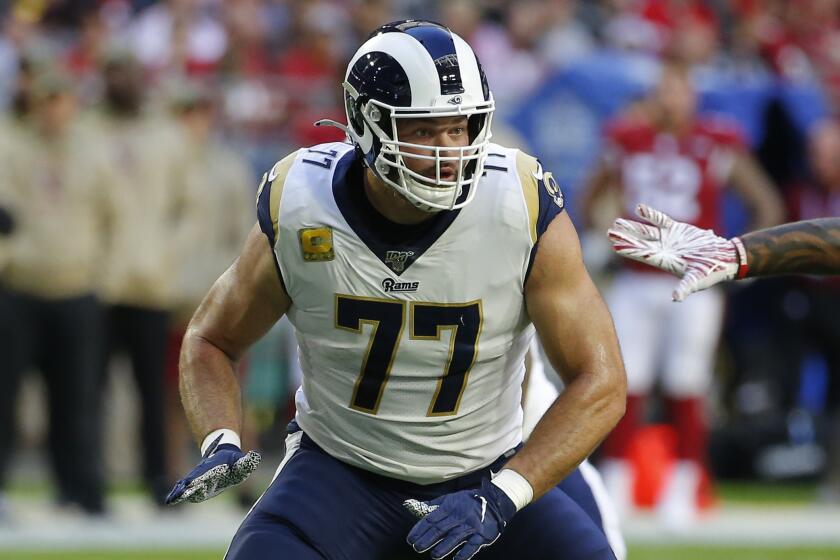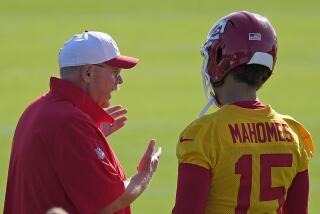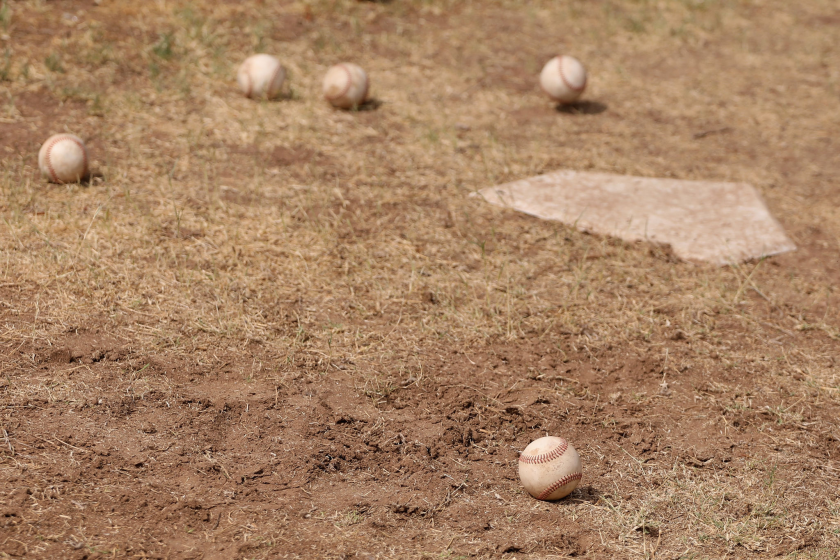NFL agreement: No preseason, less pads, more testing, players can opt out
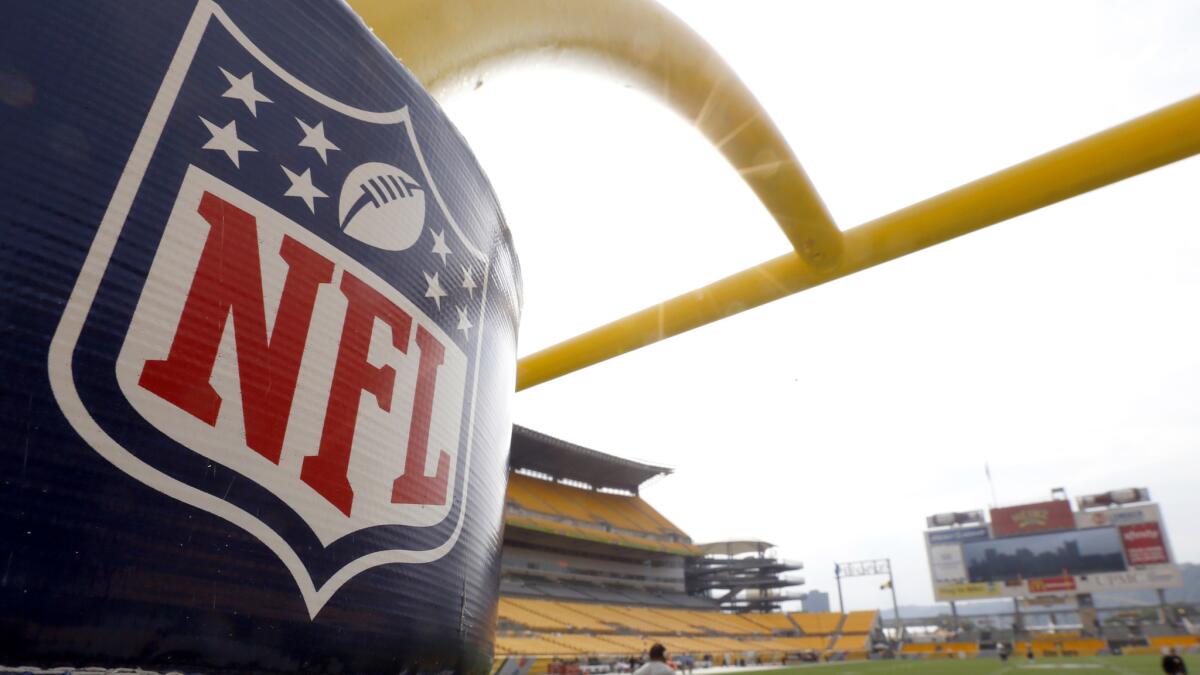
- Share via
With rookies around the NFL set to report to camps Tuesday, the league and its players’ union have found common ground on a lot of important issues:
No preseason games.
Players can opt out of the season amid COVID-19 concerns.
An expanded “acclimation period” — meaning, no pads — from seven to 18 days.
But as of Monday evening, there was no overall deal in place. Not surprisingly, it all comes down to the financial challenges of putting on a season that might not be played to completion, and how the revenue hit of 2020 will be absorbed in future seasons.
What’s left is a league in limbo looking to chart a path through the murky uncertainty of a pandemic.
NFL and the players’ union reached agreement on COVID-19 testing. The players will be tested every day for the first two weeks of camp.
With every sports league that has resumed in the age of coronavirus, the situation becomes more complicated and difficult as the restart nears. The NFL is no exception.
Testing was a significant hurdle. Whereas the league advocated that players be tested every other day, the NFL Players Assn. pushed for daily testing.
The sides met in the middle. Players will be tested daily for the first two weeks of camp, then, if the numbers meet certain standards, the testing shifts to every other day.
Specifically, if individuals in Tiers 1 and 2 — players, coaches, trainers, and others close to the team — have a positive rate that’s less than 5%, that triggers every-other-day testing. If the rate is more than 5%, daily testing continues.
In a memo sent Monday by the NFL Management Council to all teams, the league outlined the testing regimen, including the procedures for players reporting to camp. A player must test negative twice — with 72 hours of quarantining between the nasal swabs — before being allowed to enter the team facility. Starting Day 5, he is tested every day for the next two weeks.
An outside firm will conduct the testing, so it’s not as if players will be making daily trips to local emergency rooms or health clinics.
“We did not want any of our clubs to have to go to a hospital or hospital system, or a health-care facility in market and in any way take away from their capacity,” said Dr. Allen Sills, the NFL’s chief medical officer. “That was a driving force for us.”
What’s more, players, coaches and others will wear digital proximity-tracking devices that keep track of who they are coming in contact with, and for how long.
“Contact tracing is hard,” Sills said. “It’s not easy to do. When you do it the old-fashioned way, you have to rely on people’s recall of who they were around and how much time and what distance. So we’re actually really excited about having the devices that will provide a very high degree of precision.”
The league says players are expected to report. Meanwhile, players are publicly asking the NFL to address health and safety issues.
The individuals will wear the watch-sized devices at the facility, as well as having them implanted in their equipment. Players also will wear transparent mouth shields on their helmets that are aimed at reducing the likelihood of virus transmission. Of course, in a sport that’s all about physical contact, it’s hard to imagine that making a huge difference.
In recent weeks, the NFL agreed to cut the standard four weeks of exhibition games in half, then held on to the idea of one week of preseason games. The union wanted none, and Monday the league acquiesced.
The NFL also budged on the idea of players pushing the pause button on their careers for a season, although the specific details are a work in progress. So, theoretically, if a player decides not to play this season because of the pandemic, he can play next season under the terms of his 2020 contract.
The NFL and NFLPA already have agreed on more than 50 pages of protocols. It’s not as if they are starting from scratch. They are working on the last 10%, which happens to be the most nettlesome part.
Unanswered: What if the league plays only half a season? Do players get all their money? And if a player falls ill from the coronavirus, should he be placed on the non-football injury list? Because teams are not required to pay those players.
And there’s more. The salary cap is a calculation linked to the revenues of the previous season. NFL owners want the financial impact of lost revenues in 2020 to be reflected in the 2021 cap. The players want to spread that pain over the next decade so it isn’t all absorbed in one season.
Rams offensive lineman Andrew Whitworth says he and his entire family tested positive for the coronavirus after one of them had lunch with a friend.
Even if there’s no agreement on the exact path forward, players are expected to report under the terms of the current collective bargaining agreement. This isn’t a lockout or work stoppage.
All of this is a moving target with evolving issues and no easy answers. Tuesday is a soft deadline, but a far firmer one is July 28 when entire teams report. That will make for some long negotiations over the next week.
The sides have a common destination. Both want games. If history is a guide, they will find a way to resolve their differences — turbulent as it might be — and at least give it a try.
More to Read
Go beyond the scoreboard
Get the latest on L.A.'s teams in the daily Sports Report newsletter.
You may occasionally receive promotional content from the Los Angeles Times.


